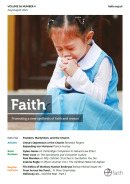Expanding our Horizons
Francis Hunter urges a new look at some ancient literature.
Frequently there is a conversation among Catholics who are literarily inclined as to which authors are worth reading. Chaucer, a magnificent Catholic writer, reminds us in The Nun’s Priest’s Tale that “saint Paul said, that all that written is, to our doctrine it is written, immediately. Taketh the fruit, and let the chaff be still” (NP I.672-677). However, which authors write favourably for “our doctrine”?
Some familiar names may come to mind. The two most common are probably Dante and Chaucer, then others like Flannery O’Connor,
J.R. Tolkien, St. Thomas Aquinas and St. Augustine follow in famili- arity. In my teaching ministry, I have found that some of the pagan authors of antiquity write both fiction and non-fiction in a manner which certainly can be seen to support Catholic doctrine. One who comes to mind wrote the famous tale of a boy turned into a donkey who meanders the Mediterranean Sea seeking salvation from his animal state and a return to the higher human form. This man is Apuleius, and his book is The Golden Ass.
The man Apuleius was a pagan Roman, born in modern day Algeria in the mid-120’s AD to a wealthy family whose father was a magistrate in the Roman colony of Madauros. Apuleius was a renowned philosopher of the Platonic school. He was so famous for his status as a philosopher that an inscription stating “To the Platonist Philosopher” was inscribed on a statue bearing his image. As a Neo-Platonist in Imperial Rome, we may conclude that he certainly was no Christian. However, St. Augustine acknowledged that the Platonists were dedicated to seeking veritas (truth). However, where the Platonists The man Apuleius was a pagan Roman and a renowned philosopher of the Platonic school. boasted strength in their reasoned approach of truth, they were running a race with one leg because they rejected divine revelation. The Church has always associated faith and reason as two tools whence the truth may be reached and preserved.Although a renowned philosopher, Apuleius was also an artist of the highest degree and is studied today primarily for The Golden
Ass, which was perhaps the first novel ever written. Rather than reviewing the text chapter by chapter, I will discuss a tale in the novel which not only supports a Catholic’s typological perspective of divine revelation, but even directs one’s attention to Marian devotion.
Books 4, 6 and 6 of The Golden Ass cover the famous tale of Cupid, the god falling in love with Psyche. Psyche, a woman said to rival Venus in beauty, engages in a love affair with a mysterious figure whom she is forbidden to see – this figure is Cupid. In the midst of her marital exercise, Psyche discovers that she is pregnant with her husband’s son, the son of the god of love. Eventually, Psyche violates her restriction of avoiding her husband’s true
countenance and lights a lamp above him while he sleeps in an attempt to murder him. Psyche then discovers that she has been entangled with not just any god but Love itself: “So all unknowing and without prompting Psyche fell in love with Love, being fired more and more with desire for the god of desire”. Unfortunately, because of Psyche’s lack of faith, Cupid leaves her only to return after she is tormented by Venus, Cupid’s mother. Jupiter – who resembles God the Father in this text – acts as the ultimate instrument of justice and provides the mother and wife of gods her eternal reward: “He [Jupiter] gave her a cup of ambrosia, and said: ‘Take this, Psyche, and become immortal. Cupid will never part from your embrace; this marriage of yours will be eternal’”.
Although a pagan, Apuleius does live in the Christian era and must have been introduced directly or indirectly to the Gospels. As Catholics, we believe in the Assumption of the Blessed Virgin, the Mother of God, who is informed of by the messenger archangel, Gabriel, in the Gospel of Luke: “Hail, favored one; the Lord is with you…for you have found favor with God; and behold, you shall conceive in your womb and bring forth a son” (Luke 1:28). Mary, Mater Dei, is at this point engaged in the allegory told by Apuleius: the woman
chosen by God will bear the son of that God; however, for Psyche this brings her reverence as someone who is divine, while Mary will be praised for her cooperation with divinity and her role as the Mater Dei. The greatest similarity here may be found between the nature of the Numina (god heads) which conceive in their respective women.
As we read above, Psyche is bearing the child of love itself. A Catholic’s attention should readily connect with this idea, and he or she should refer to Pope Benedict XVI’s encyclical letter, Deus Caritas Est.
Pope Benedict beautifully denotes the nature of God as Love both ascending and descending, loving simultaneously with eros and agape (Benedict 10-11).
Pope Benedict evaluates the nature of love
– principally the difference between eros (erotic love) and philia (love of a friend) – to establish a continuity between the ancient view of the Pagan gods versus that of our true monotheistic faith. While Pope Benedict acknowledges the problem of eros, specifically how “Eros, reduced to pure ‘sex,’ has become a commodity, a mere ‘thing’ to be bought and sold,” (8) he nonetheless recognizes that “there is a certain relation- ship between love [eros] and the Divine” (7). God gives us love through his very being, his actus essendi; we experience His love not just through our existence, but also by the life and ministry of Christ in the Gospels. Any person, having been made in the image of God, must return the love which he or she receives. Pope Benedict notes that God’s love is fully eros in that He receives love from us when we have faith and follow His laws; however, it is also descending in agape in that “so great is God’s love for man that by becoming man he follows him even into death, and so reconciles justice and love” (14). God’s love is not absent in Apuleius’ Pagan illustration, in that Cupid puts himself at risk, specifically with his mother Venus, to give his love to a mortal woman (agape) and to receive that love in return (eros). Furthermore, our Pagan friend Apuleius touches God’s truth by depicting Love itself as entering a marriage
with Psyche rather than just an affair. Pope Benedict stresses the importance of this form of Divine Love by discussing the union of God with Israel (to me the archetype on which the tale of Cupid and Psyche may be based): “God’s relationship with Israel is described using the metaphors of betrothal and marriage; idolatry is thus adultery and prostitution” (13).
In writing this essay, I do not wish to merely emphasize the greatness of Apuleius (which is undisputed), but rather to enter into a dialogue with the Western Canon in order to expand our Catholic literary horizons and seek true art wherever it may be found. Ars gratia artis et artifex gratia Deo. Art is only thus in that it is beautiful. Beauty is always a goal when producing art. In fact, for the Christian artist, a work that lacks beauty fails to acknowledge the splendor of the Great Artist, our Creator God. Although works of art, whether they be statues, paintings, symphonies, or literature are made “in the image of
man,” man behaves in imago Dei when he or she creates something. Just as God created all things with His logos, so too did Apuleius, and all the other magnificent pagans and Christians craft a cornucopia of works which directly, or indirectly, point to His truth.
Francis Hunter teaches at a Catholic preparatory school in New York.






